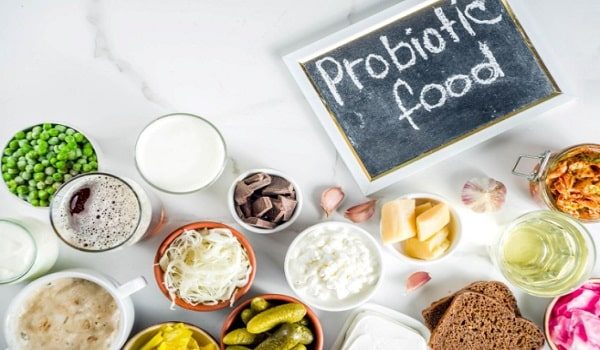
Probiotics: Enhancing Your Health and Wellness
Investigating the area of probiotics and shedding light on their importance, source, and complementary relationship with prebiotics for optimal health and well-being is the aim of this comprehensive study.
Getting to Know Your Inner Ecosystem: The Microbiome
This ecosystem is a lively place. Among them, probiotics are beneficial bacteria that provide a wide range of health advantages when present in sufficient quantities.
The Harmony of Digestion:
Probiotics contribute to the balance of bacteria in the gut, which is one way they support digestive harmony. They support regular bowel motions, nutrient absorption, and the process of food digestion. In particular, maintaining proper equilibrium may help decrease digestive problems, including abdominal discomfort, diarrhoea, and irritable bowel disorder (IBS).
Stimulating the Immune System:
Numerous elements of the immune system are found in the intestines. Probiotics are crucial for reestablishing the immune system’s proper operation since they may both strengthen the immune response and guard against potentially dangerous infections. An optimally balanced microbiome is essential for immune system health in general.
Improving One’s Mood and Mental Health:
The term “gut-brain axis” pertains to an emerging correlation between the stomach and the brain that has recently been uncovered by scientists. The potential effects of probiotics on temperament and mental health could assist in the treatment of anxiety and stressful situations, in addition to chronic disorders like anxiety.
The Nutrient Synthesis:
Specific strains of probiotics contribute to the synthesis of vital nutrients, including B vitamins and vitamin K. The provision of this nutritional supplement facilitates the optimal operation of the body and enhances the general health of the individual.
The Natural Ways to Improve Gut Health Through the Use of Probiotics
There is a wide variety of naturally fermented foods and pills that include probiotics, providing you with a variety of alternatives to integrate into your daily routine by incorporating them.
Yoghurt: One of the most widespread forms of probiotic intake is yoghurt. Another tasty and flexible option for supporting gut well-being and elimination processes is milk, which is fermented with live cultures. Select yoghurts that are identified as containing live or engaged bacteria.
Kefir: Fermented milk, or kefir, supplies many health upsides, including the ability to lower cholesterol, regulate blood sugar, and increase the condition of the gut.
Sauerkraut: Fermented cabbage becomes sauerkraut, one of the traditional meals rich in probiotics. Apart from adding a tart taste, the fermentation procedure boosts the quantity of probiotics in the final product. Unpasteurised sauerkraut is the greatest option for maximising the health benefits of probiotics.
Kimchi: Kimchi is a fermented vegetable dish popular in Korean cuisine. It typically utilises cabbage and radishes as its primary ingredients. The addition of kimchi to meals is a flexible choice since it is loaded with probiotics and has a burst of flavour.
Miso: The fermentation of soybeans with salt and koji, which is a kind of fungus, results in the production of miso, which is a traditional Japanese spice. Miso soup relies heavily on it as a fundamental ingredient, and it also adds probiotics to the diet.
Pickles (Brine-Cured): Pickles made without the use of vinegar and by natural fermentation are a good source of probiotics. Brine-cured pickles are superior to pasteurised pickles when it comes to probiotic benefits.
Probiotic Supplements: To increase your intake of the bacteria in a straightforward and concentrated manner, you may take probiotic pills in addition to eating dietary sources of the bacteria. Certain bacterial strains that are well-known for their positive health benefits are often included in these supplements. When combined, prebiotics and probiotics may increase each supplement’s effectiveness even more.
How to Get the Most Out of Prebiotics and Feed Probiotics for the Best Results
Prebiotics are indigestible fibres that provide probiotics with nourishment. The development and proper operation of the beneficial bacteria that probiotics bring into the stomach depend on the nutrition that prebiotics provide. Synbiotics are a helpful combination of probiotics and prebiotics, as the name suggests.
Here are some techniques for maximising the advantages of prebiotics and ensuring they effectively complement probiotic activity:
Rich in Dietary Fibre Foods
Fruits, vegetables, and whole grains are among the foods rich in dietary fibre that naturally contain prebiotics. These fibres pass through the upper gastrointestinal system without being broken down, arriving in the colon to feed probiotics.
Supplements with Prebiotics
Supplemental prebiotics are made expressly to provide a concentrated form of prebiotics. Fibres such as fructooligosaccharides (FOS), chicory root, and inulin are often included in these supplements. They provide the ideal conditions for probiotic colonisation in the gut when eaten in conjunction with probiotic supplements.
Resistant Starches
Prebiotics are produced by resistant starches, which are present in foods including green bananas, legumes, and certain whole grains. They go through the small intestine without being broken down and arrive in the colon, where they aid in the probiotics’ development.
Foods Rich in Polyphenols
Dark chocolate, tea, and berries are examples of foods high in polyphenols, which are chemicals with prebiotic qualities. They may have a beneficial effect on the gut flora, creating an environment that supports probiotic action.
Supplements: Customising the Intake of Prebiotics and Probiotics
Supplements provide a focused method to guarantee adequate consumption of both probiotics and prebiotics in the pursuit of good gut health.
Probiotic Supplements
Probiotics Supplements come in a variety of formats, such as liquid formulations, powders, and capsules. Take into account the particular strains included in the supplement as well as the targeted advantages when selecting a probiotic. While some supplements may focus on certain ailments, others may be made for overall gut health.
Prebiotic Supplements
Prebiotics supplements usually include certain kinds of fibre that are known to have prebiotic qualities. For those who want to increase their prebiotic consumption without just eating it, these supplements may be very helpful.
Synbiotic Supplements
Probiotics and prebiotics are combined in one composition to provide synbiotic pills. By supplying the good bacteria with the food they need to flourish, these supplements seek to provide a holistic approach to gut health.
In Summary
The delicate dance of health and well-being centres on gut harmony. Gut health is maintained by probiotics and prebiotics, which work together to improve digestion and general health. A healthy and diversified gut flora improves health and vigour from diet to supplements.
The path to gut harmony is personal, whether you’re eating yoghurt, fermented foods, or supplements. Our awareness of the gut microbiota and the role probiotics and prebiotics play in our health story grows as science advances. Accept the symbiotic connection between these bacteria and your health and nurture your body with probiotics and prebiotics.



